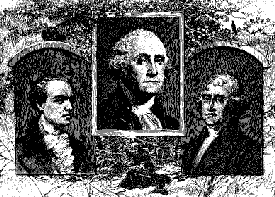
I have listed some court decisions which provide definitions and judicial opinions on various issues I have addressed in my discussion of Minnesota's banana republics.
Again, I am not a lawyer, and obviously, the way I perceive the statements made in these court decisions is not in any way intended to be legal advice or legal opinion.
This was a qui tam case against the state of Minnesota in which the state of Minnesota took the position it was immune from being sued by an individual. The U.S. argued that the individual bringing the suit is a relator, and defines the term here. With the individual acting as a relator, the court ruled that the state had no Eleventh Amendment immunity to qui tam suits.
The court stated "if they [the states] take the King's shilling, they take it cum onerer." That is, they abide by the King's rules.
Contains definitions of defamation and states that Minnesota courts must apply federal constitutional standards that are applicable to cases like this.
Defines the three kinds of defamation recognized by the state of Minnesota: (1) statements that are clearly defamatory on their face, (2) those that could not possibly have a defamatory meaning, and (3) those that are reasonably susceptible to a defamatory meaning as well as an innocent one.
This court reversed "the district court's judgment that Minnesota law does not provide private persons with a claim for defamation by implication."
The court stated that verbal threats do not constitute a §1983 claim unless the coercive pressure causes the victim to suffer the deprivation of a constitutional right. Especially if the threats are backed up with conduct suggesting the alleged threats will be acted upon.
The person threatened must be effectively deprived of free choice.
Discussion notes that "...although the City [in this case Fargo, ND] may not be held liable for the mistakes of its officers on a respondent superior basis, it is not entitled to the shield of qualified immunity afforded to it's officers." Cities can be held responsible for providing training for their police officers so that the officers are aware of civil rights and can avoid violating them..
Later, the decision notes that "the purpose of the qualified immunity doctrine is to provide ample room for mistaken judgments and to protect `all but the plainly incompetent or those who knowingly violate the law.'"
The district court held the City of Fargo liable under 42 U.S.C. §1983 for deliberately failing to train its police officers.
While the 8th Circuit decision did not address the issue of the City of Fargo's failing to train it's police officers, the 8th Circuit decision did affirm that a city is not protected by qualified immunity and can be held responsible for the training of it's police officers.
This decision also states that "Government officials performing discretionary functions may rely on the defense of qualified immunity to shield them from liability for civil damages unless their conduct violates `clearly established statutory or constitutional rights of which a reasonable person would have known.'"
In this discussion of qualified immunity, the 8th Circuit decision refers to Valley v. Briggs, 475 U.S. 335, 341 (1986) , noting that qualified immunity protects "all but the plainly incompetent or those who knowingly violate the law."
The issue here was the statute of limitations on personal injury claims. It was noted that in Wilson v. Garcia, 471 U.S. 261 (1985), the court "held that 42 U.S.C. § 1983 claims are subject to the limitations period in each state's personal-injury statute, which in Minnesota is governed by a six year limitation.
In this decision, the 8th Circuit decision stated that "The court held that §1983 claims are better characterized as personal-injury actions because it is unlikely that the limitations period for personal-injury actions `ever was, or ever would be, fixed in a way that would discriminate against federal claims, or be inconsistent with federal law in any respect.'"
The 8th Circuit decision also noted that the Eleventh Amendment does not prevent a person from seeking damages from a state official in a personal capacity, but a person wishing to sue a state official must specify in the complaint that it is being done in a personal capacity.
This decision by the 9th Circuit court also notes that "Government officials enjoy qualified immunity from civil damages unless their conduct violates `clearly established statutory or constitutional rights of which a reasonable person would have known." Harlow v. Fitzgerald, 457 U.S. 800, 818 (1982)...
This 9th Circuit decision does provide some guidelines for determining qualified immunity: "Determining whether a public official is entitled to qualified immunity `requires a two-part inquiry: (1) Was the law governing the state official's conduct clearly established? (2) Under that law could a reasonable state official have believed his conduct was lawful?'"
This court's discussion states that "this standard `gives ample room for mistaken judgments by protecting all but the plainly incompetent or those who knowingly violate the law.'"
The 9th Circuit court's discussion notes that it "places great weight" on the history of problems leading up to this case.
Refers to Minnesota Supreme Court definition of "malicious wrong" as "one in which the `official has intentionally committed an act that he or she had reason to believe is prohibited." 518 N.W. 2nd at 571.
Banana Republics in The Heartland
Timeline of Events in Spite Fence Issue
Additional Rights Violation Incidents
Essay on Minnesota's Banana Republics
© Copyright 2001 Whiskey Creek Document Design. All Rights Reserved